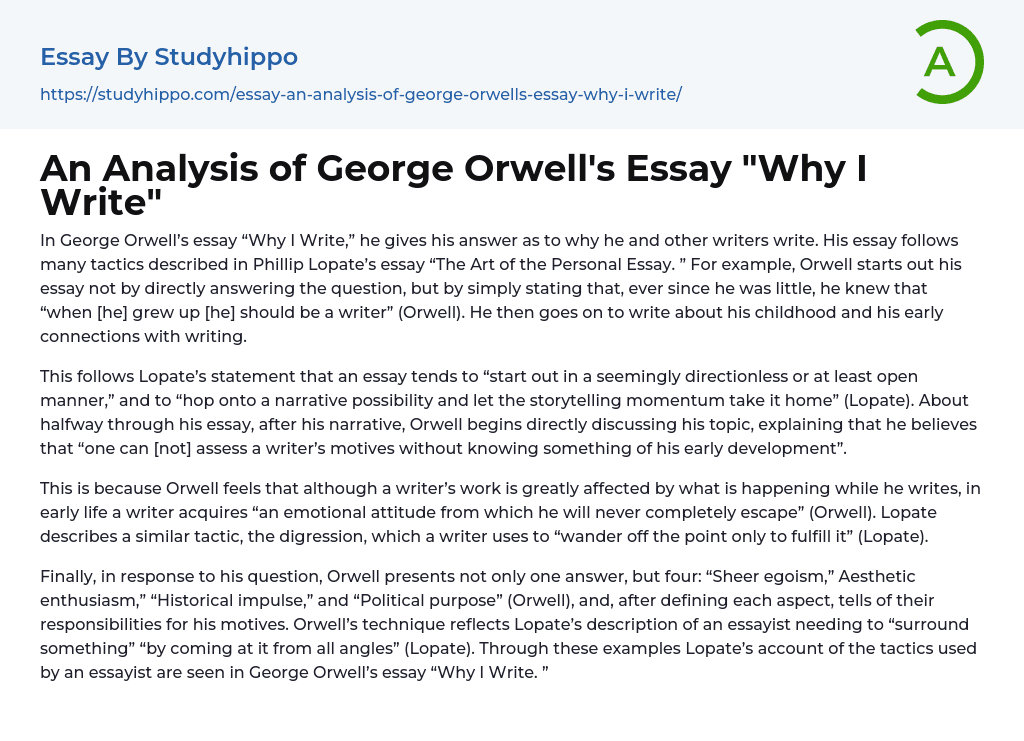In George Orwell’s essay “Why I Write,” he gives his answer as to why he and other writers write. His essay follows many tactics described in Phillip Lopate’s essay “The Art of the Personal Essay. ” For example, Orwell starts out his essay not by directly answering the question, but by simply stating that, ever since he was little, he knew that “when [he] grew up [he] should be a writer” (Orwell). He then goes on to write about his childhood and his early connections with writing.
This follows Lopate’s statement that an essay tends to “start out in a seemingly directionless or at least open manner,” and to “hop onto a narrative possibility and let the storytelling momentum take it home” (Lopate). About halfway through his essay, after his narrative, Orwell begins directly discussing his topic, explaining that he believes that “one can [not
...] assess a writer’s motives without knowing something of his early development”.
This is because Orwell feels that although a writer’s work is greatly affected by what is happening while he writes, in early life a writer acquires “an emotional attitude from which he will never completely escape” (Orwell). Lopate describes a similar tactic, the digression, which a writer uses to “wander off the point only to fulfill it” (Lopate).
Finally, in response to his question, Orwell presents not only one answer, but four: “Sheer egoism,” Aesthetic enthusiasm,” “Historical impulse,” and “Political purpose” (Orwell), and, after defining each aspect, tells of their responsibilities for his motives. Orwell’s technique reflects Lopate’s description of an essayist needing to “surround something” “by coming at it from all angles” (Lopate).
Through these examples Lopate’s account of the tactics used by an essayist are seen in George Orwell’s essay “Why I Write. ”
- Aldous Huxley essays
- Alice Walker essays
- Amy tan essays
- Anne Bradstreet essays
- Anton Chekhov essays
- Arthur Miller essays
- Augustine essays
- Bertolt Brecht essays
- Booker T Washington essays
- Carol ann duffy essays
- Charles Dickens essays
- Charlotte Perkins Gilman essays
- Chinua Achebe essays
- Christina Rossetti essays
- Consider The Lobster essays
- Edgar Allan Poe essays
- Elizabeth Bishop essays
- Emily Dickinson essays
- Ernest Hemingway essays
- F. Scott Fitzgerald essays
- George Orwell essays
- Harper Lee essays
- Homer essays
- James Baldwin essays
- Jane Austen essays
- John Donne essays
- John Steinbeck essays
- Kate Chopin essays
- Kurt Vonnegut essays
- Langston Hughes essays
- Leonardo Da Vinci essays
- Mark Twain essays
- Mary Shelley essays
- Maya Angelou essays
- Nathaniel Hawthorne essays
- Oscar Wilde essays
- Percy Bysshe Shelley essays
- Peter Skrzynecki essays
- Phillis Wheatley essays
- Poets essays
- Ralph Waldo Emerson essays
- Ray Bradbury essays
- Richard Rodriguez essays
- Robert Browning essays
- Robert Frost essays
- Robert Louis Stevenson essays
- Seamus Heaney essays
- Sherman Alexie essays
- Sophocles essays
- Stephen King essays




